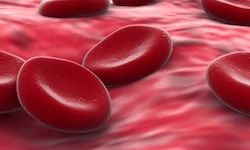Onvansertib May Be a New Frontline Option for Patients With Venetoclax-Resistant AML
Onvansertib inhibits tumor growth in patients with acute myeloid leukemia who are resistant to venetoclax, according to the in-vitro and in-vivo data from a phase II trial announced in a press release issued by Trovagene, Inc.

Onvansertib (PCM-075) inhibits tumor growth in patients with acute myeloid leukemia (AML) who are resistant to venetoclax (Venclexta), according to the in-vitro and in-vivo data from a phase II trial announced in a press release issued by Trovagene, Inc.1
Results from the phase II study of onvansertib in combination with either low-dose cytarabine or decitabine (Dacogen) in patients showed the synergy between onvansertib and venetoclax in addition to tumor growth inhibition. The synergy observed supported onvansertib as it functioned to limit resistance to venetoclax in patients with AML. Investigators hypothesize that onvansertib can be a new therapeutic option for individuals with venetoclax-resistant AML and increase progression-free survival and overall survival (OS).
Trovagene noted the importance of these results by highlighting that patients with AML can develop resistance to frontline venetoclax within 11 months of treatment and have a median OS of about 1.7 months to 2.3 months. Once the resistance begins, there is currently no second option.
"We are very encouraged by the data suggesting that onvansertib will be able to rescue AML patients once they develop resistance to frontline treatment with venetoclax," said Mark Erlander, PhD, chief scientific officer, Trovagene, in the press release.
In the trial, patients were given the recommended phase II dose of onvansertib orally (12mg) daily on days 1 through 5 of a 28-day cycle plus decitabine (20mg) intravenously on days 1 through 5 of a 28-day cycle. Treatments were modified, if necessary, due to hematopoietic function or toxicities of grade 1 or higher. The primary endpoint of the study was complete response (CR) and CR with incomplete blood count recovered, which was defined as a morphologic leukemia-free state (MLF). The key secondary endpoints were the rate of MLF achievement, rate of partial response, duration of response, event-free survival, and OS.2
“In our current Phase II AML trial, we are targeting venetoclax-resistant patients and treating them with the combination of onvansertib plus hypomethylating agent decitabine. We are also considering plans to conduct a future clinical trial of onvansertib in combination with venetoclax in patients showing initial signs of resistance to venetoclax to provide a new therapeutic option in an indication with significant clinical need,” Erlander mentioned in a statement.
A histologically confirmed diagnosis of AML with blasts greater than 20%, and an Eastern Cooperative Oncology Group (ECOG) performance status ≤ 2 were required for patients to enroll in the study. Participants were also required to be relapsed or refractory to frontline therapy or recently diagnosed with untreated AML, who are eligible for standard intensive induction therapy.
Individuals were excluded from the trial if they had treatment-related AML or acute promyelocytic leukemia. Other key exclusion criteria were active malignancies within 12 months, active central nervous system leukemia, active and uncontrolled disease other than AML, grade 2 or higher toxicities from prior therapy, and treatment with systemic therapy within 14 days of beginning treatment in the study.
The phase II study is ongoing, and investigators plan to enroll a total of 35 patients. The expected completion date is October 2021.
Onvansertib, a first-in-class, third-generation, oral adenosine triphosphate, is also being evaluated in other clinical trials for malignancies like prostate cancer, non-Hodgkin lymphoma, colorectal cancer, triple-negative breast cancer, and others. The drug also has an FDA Orphan Drug Designation, as well as a European indication for treatment of patients with AML.1
References
- Trovagene Announces Data Showing Ability of Onvansertib to Rescue Venetoclax-Resistance in Acute Myeloid Leukemia (AML) [press release]. San Diego, California: Trovagene, Inc; December 4, 2019. https://bit.ly/2LFqC8n. Accessed December 5, 2019.
- Onvansertib in Combination With Either Low-dose Cytarabine or Decitabine in Adult Patients With Acute Myeloid Leukemia (AML). ClinicalTrials.gov. Accessed December 5, 2019. https://bit.ly/34YKn2k.
Epcoritamab Delivers Durable Responses in Anthracycline-Ineligible LBCL
December 12th 2024Fixed-duration, subcutaneous epcoritamab-bysp achieved durable responses with a manageable safety profile in older patients with newly diagnosed large B-cell lymphoma who are not candidates for anthracycline-based therapy.
Read More
Lower Cardiac Risks Found With Second-Generation BTK Inhibitors in B-Cell Hematologic Disorders
December 12th 2024In a meta-analysis, second-generation BTK inhibitors were linked to a significantly low incidence of atrial fibrillation, overall cardiac adverse events, and heart failure in patients with B-cell hematologic malignancies.
Read More